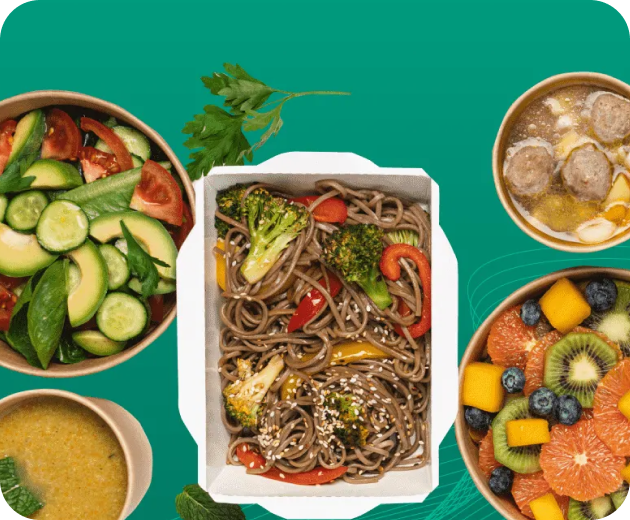Food Waste: Bite-sized Steps for a Big Impact
Food. It fuels our bodies, nourishes our communities, and brings people together. But in the shadows of this essential resource lies a growing crisis: food waste. From farms to landfills, a staggering amount of food never reaches our plates, leading to resource depletion, environmental damage, and even health issues.
In this piece, we will explore the issue of food waste and provide bite-sized steps that you can take to make a big impact in reducing it.
What is Food Waste?
Food waste refers to any food that is discarded or lost along the supply chain, from production and processing to consumption and disposal. This includes fruits and vegetables left to rot on farms, unsold products at grocery stores, leftover scraps from restaurants, and even uneaten meals in our own homes.
A recent report by the United Nations estimates that about one-third of all food produced globally is lost or wasted each year, which amounts to approximately 1.3 billion tons of food.
The Consequences of Food Waste
The environmental impact of food waste is significant. As food decomposes in landfills, it releases methane gas, a greenhouse gas with 21 times the global warming potential of carbon dioxide.
In addition, the resources used to produce wasted food, such as water and land, are also wasted. This not only puts a strain on our planet’s resources but also contributes to issues like deforestation and biodiversity loss.
Food waste also has economic consequences. The financial losses for farmers, retailers, and consumers can add up quickly.
In the United States alone, it is estimated that $218 billion worth of food is wasted each year. This not only affects the food industry but also impacts the affordability and accessibility of food for those who are food-insecure.
According to the World Food Programme, each year, we waste a staggering one-third of all food produced globally, amounting to 1.3 billion tons annually.
That’s like throwing away perfectly good meals enough to feed 2 billion people. This colossal waste isn’t just a moral issue; it also depletes precious resources like water, land, and energy.
Where Does This Waste Hide?
Food waste creeps in at every stage of the food chain. In households, overbuying, poor storage, and unrealistic expectations often lead to spoilage.
The food & beverage industry faces challenges like imperfect harvest practices, transportation losses, and confusing expiration labels.
Tips For Reducing Food Waste at Home
The good news? You can be a changemaker right in your kitchen. Here are some bite-sized strategies:
Plan your meals
Create a grocery list based on planned meals: This helps avoid impulse buys and ensures you only purchase what you need.
Apps like Mealime or Plan to Eat can help you plan meals and generate grocery lists.
Embrace meal prep
Cook in bulk and portion leftovers into freezer-friendly containers. Enjoy delicious, home-cooked meals throughout the week without the hassle of daily cooking.
Websites like Budget Bytes and The Spruce Eats offer countless meal prep recipes and tips.
Befriend the fridge
Learn proper storage techniques to extend the shelf life of your produce. This can be as simple as storing apples away from other fruits or wrapping leafy greens in damp paper towels.
Follow influencers like @creative_explained on Instagram for expert tips on storing different types of produce.
Get creative with leftovers
Transform leftovers into entirely new dishes. Leftover chicken can become a stir-fry, roasted vegetables can be added to frittatas, and the possibilities are endless.
Websites like Love Food Hate Waste and The Kitchn offer inspiration and recipes for using leftovers in creative ways.
Compost food scraps
Turn food scraps into nutrient-rich soil for your garden by composting. This reduces waste and provides valuable nutrients for your plants.
Chef Max Le Manna’s website offers a wealth of recipes specifically designed to use up food scraps, minimizing waste while creating delicious meals.
Bonus tip: Consider starting a small indoor compost bin if you don’t have access to outdoor composting facilities. Companies like Bokashi Living and Full Circle Home offer convenient and user-friendly options.
By incorporating these simple strategies into your routine, you can significantly reduce food waste and contribute to a more sustainable future.
Cooking More, Wasting More? Insights From the Latest Tastewise Survey
Food waste lurks in all corners of our kitchens, impacting our wallets and the planet. But what are the actual behaviors behind this issue?
We analyzed the latest Tastewise survey to illuminate our home cooking habits and their surprising link to food waste.
Home chefs, wasteful habits?
Contrary to expectations, the survey revealed that 81% of respondents cook more at home than dine out. While this seems positive, it raises a crucial question: are we inadvertently wasting more food in our kitchens?
Flavor first, convenience takes a backseat
Interestingly, the survey found that specific foods and cuisines influence nine times more respondents than convenience.
While this love for culinary exploration is commendable, it might lead to impulse purchases and overstocking ingredients for specific dishes.
The shocking gap: Strategies missing in action
The most alarming finding? Less than 1% of Tastewise respondents reported using strategies to reduce food waste.
This highlights a significant disconnect between awareness and action, suggesting a need for readily available tips and solutions from Tastewise.
Beyond individual choices: The bigger picture
While the survey focused on individual habits, it’s crucial to recognize the broader context. Choosing local produce over organic sometimes reduces transportation emissions, and supporting sustainably sourced brands can make a difference. Every informed choice, big or small, contributes to a healthier food system.
Beat the waste, and boost your day with the sustainable Proffee delight
This protein-packed smoothie combines the invigorating kick of coffee with the creamy goodness of almond milk, sweetened with a touch of organic honey.
But beyond the refreshing flavor, this recipe embodies Tastewise’s commitment to promoting sustainable choices in the kitchen.
A Recipe Inspired by Trending Ingredients
This trend blends coffee with protein powder (proffee), creating a satisfying and nutritious drink. Not only is it delicious, but it also utilizes leftover brewed coffee that might otherwise go to waste.
Leftover coffee is a common culprit in households, and this recipe offers a delicious way to repurpose it, reducing food waste and maximizing your resources.
The rise of plant-based diets has led to a surge in the popularity of alternative protein sources like pea, rice, and hemp protein.
These options often require less land and water than traditional animal-based protein sources, contributing to a more sustainable food system.
Choosing plant-based protein powder aligns with Tastewise’s commitment to promoting responsible and environmentally friendly choices in the kitchen.
Sustainability beyond the plate
While the recipe itself embodies responsible choices, Tastewise is committed to empowering you to make sustainable decisions throughout your culinary journey.
Tastewise helps you
Discover trends and emerging ingredients
Explore ingredients like upcycled foods, seasonal produce, and plant-based alternatives that align with sustainability goals.
Tastewise showcases these ingredients in our recipes, articles, and guides, making it easy to incorporate them into your cooking and discover delicious, sustainable options.
Reduce food waste
Find creative recipes and hacks to use up leftovers, prevent spoilage, and minimize food waste in your kitchen.
We offer a vast collection of recipes specifically designed to utilize leftovers, preventing them from ending up in the trash.
Additionally, our storage guides and tips help you extend the shelf life of your ingredients, reducing waste.
Support sustainable brands
Identify brands committed to ethical sourcing, responsible practices, and environmental consciousness. Tastewise partners with and highlights brands that prioritize sustainability, allowing you to make informed choices that align with your values.
The Sustainable Proffee Delight is just one example of how deliciousness and sustainability can go hand-in-hand.
Innovation within the industry is crucial to tackling food waste. Here are some promising initiatives:
- Upcycling “imperfect” produce: Give misshapen fruits and vegetables a second chance by incorporating them into juices, jams, or soups.
- Improving supply chain efficiency: Optimizing transportation and storage reduces losses before food even reaches stores.
- Clearer labeling: Standardizing and clarifying expiration dates can combat confusion and unnecessary waste.
- Donating surplus food: Partnering with food banks and donation programs ensures edible food reaches those in need.
Resource Depletion: a Looming Threat
Food production heavily relies on natural resources like water, land, and fossil fuels. Food waste exacerbates these concerns, placing additional strain on already strained ecosystems.
This, in turn, can disrupt food security and contribute to rising food prices, impacting our health and well-being.
Sustainable Solutions for the F&B Industry
The industry can mitigate resource depletion through:
- Investing in water-efficient technologies: From precision irrigation to rainwater harvesting, innovative solutions can conserve this precious resource.
- Adopting sustainable farming practices: Organic farming and regenerative agriculture methods improve soil health and reduce reliance on chemical inputs.
- Embracing renewable energy sources: Shifting to solar, wind, or geothermal power reduces the carbon footprint of food production.
An intriguing statistic from Tastewise reveals that in the UK, there are almost twice as many social conversations per capita about food waste compared to the US.
This suggests a heightened awareness and concern among UK consumers, potentially driven by factors like higher food prices or proximity to environmental issues.
Perhaps this presents an opportunity for the UK F&B industry to lead the way in innovative solutions and inspire global action.
Tackling food waste and promoting sustainable consumer behavior is a collective responsibility. By making informed choices at home and supporting businesses committed to responsible practices, we can create a healthier planet and a more secure food future for all.
Craving more food for thought? Explore sustainable eats & industry insights on the Tastewise platform.
FAQs
Food waste refers to food that is produced but never consumed. It occurs at every stage of the food supply chain, from production and storage to retail and consumer households. This waste includes spoiled produce, unsold inventory, or uneaten leftovers, all of which contribute to environmental and economic challenges.
Food waste is a major environmental concern because it contributes to greenhouse gas emissions, depletes natural resources, and adds pressure to landfills. It is also a humanitarian issue, as millions go hungry while large volumes of edible food are discarded. Reducing waste supports climate goals and food equity.
Fruits and vegetables are the most commonly wasted, largely due to spoilage and aesthetic standards in retail. Dairy and baked goods also have high waste rates due to short shelf lives. Addressing these categories with better storage, forecasting, and consumer education can significantly reduce overall waste.




